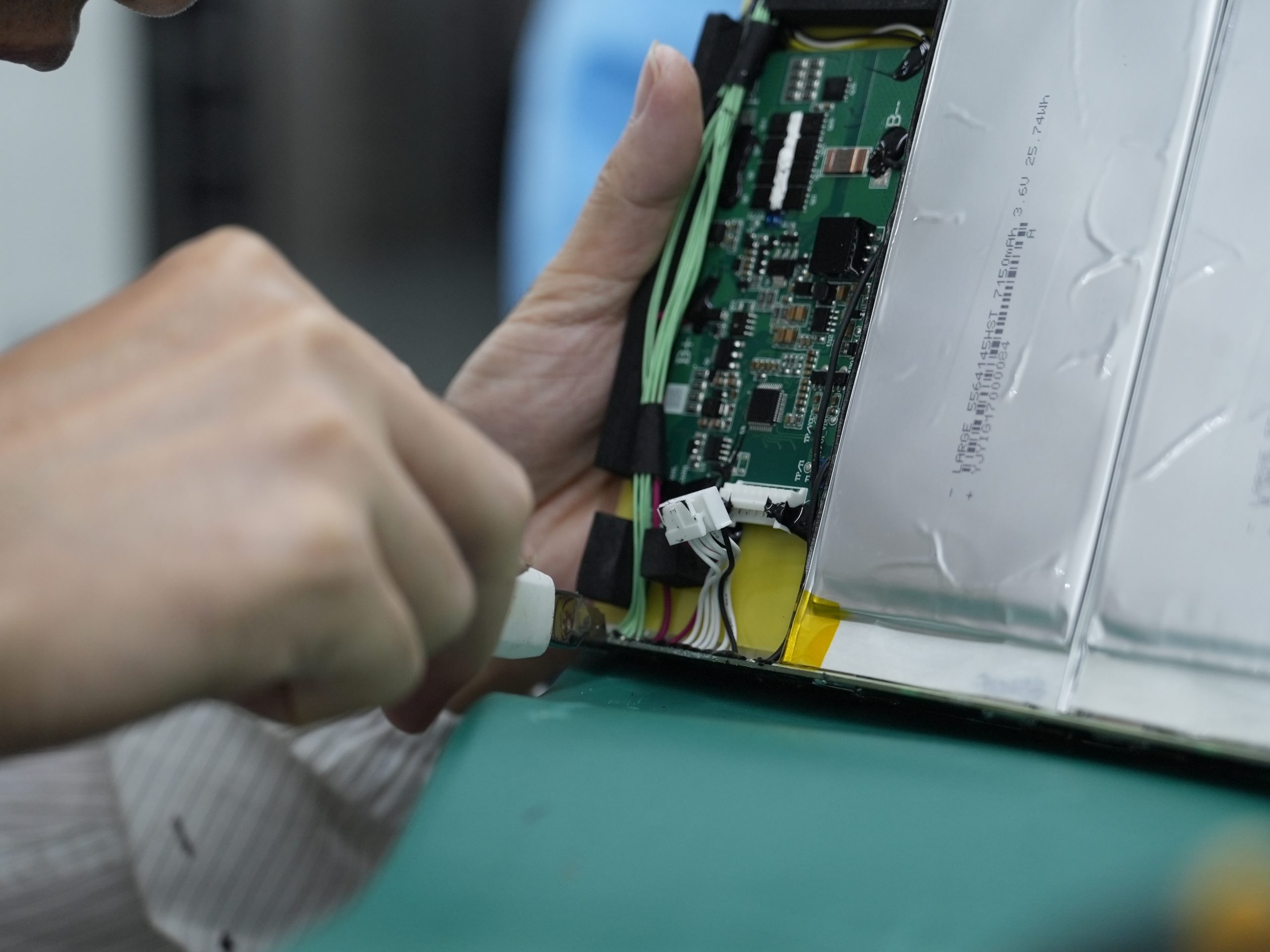
You face constant challenges when inspecting power systems outdoors. High humidity can cause water ingress, sometimes leading to thermal runaway in lithium battery packs. Elevated temperatures speed up battery degradation. Severe weather increases risks like electrical arcing. Using ip65-protected batteries for outdoor applications helps you avoid these hazards, ensuring reliable and safe operation. Prioritizing IP65 protection keeps your inspection tools functioning even in the toughest conditions.
Key Takeaways
IP65-protected batteries ensure reliable performance in harsh outdoor conditions, reducing risks of water and dust damage.
Choosing batteries with high IP ratings minimizes maintenance needs and extends operational uptime, saving time and costs.
Always match battery specifications, like capacity and discharge rate, to your inspection tasks for optimal performance.
Regularly inspect battery casings for wear to maintain safety and prevent unexpected failures during outdoor inspections.
Evaluate suppliers for quality certifications to ensure the reliability and safety of your IP65-protected batteries.
Part1: IP65-Protected Batteries: Why They Matter
1.1 Outdoor Inspection Challenges
You encounter many obstacles when you perform outdoor inspections. Dust, rain, and temperature extremes threaten the reliability of batteries. In medical, robotics, security, infrastructure, consumer electronics, and industrial applications, you need batteries that withstand harsh conditions. Standard lithium battery packs struggle in cold weather. Charging below +5°C can damage them. Some advanced batteries use self-heating systems, allowing charging down to -20°C. Rapid development cycles and global supply chain support help you deploy solutions quickly and maintain operations worldwide.
Cold-weather charging limitations restrict standard batteries.
Quick deployment needs drive the use of standard components.
Localized supply chains ensure batteries reach global teams.
1.2 Risks Without IP65 Protection
If you use batteries without high ip ratings, you expose your equipment to serious risks. Dust can enter the battery casing, causing mechanical failure. Water ingress leads to electronic malfunctions and short circuits. These problems increase downtime and maintenance costs. Non-protected batteries fail more often in outdoor environments. You lose operational uptime and face unexpected breakdowns.
Feature | IP65-Protected Batteries | Non-Protected Batteries |
|---|---|---|
Dust Resistance | Complete | Limited |
Water Resistance | High (water jets) | Low |
Reliability in Harsh Conditions | Consistent | Unpredictable |
Maintenance Needs | Reduced | Increased |
Operational Uptime | Extended | Shortened |
Tip: Always check the ip rating system before choosing batteries for outdoor inspection. High ip ratings mean better protection against environmental hazards.
1.3 Reliability in Harsh Conditions
You need batteries that deliver consistent performance in extreme temperatures and severe weather. The ip rating system helps you identify batteries that meet these demands. IP65-protected batteries undergo rigorous testing. They resist dust and water, ensuring safe operation in challenging environments. You benefit from fewer breakdowns and longer equipment lifespan.
Temperature Condition | Effect on Battery Performance |
|---|---|
Low Temperatures | Slower discharge rates, reduced capacity, increased internal resistance, significant voltage drop, potential safety risks when charging below freezing. |
High Temperatures | Accelerated degradation of internal components, reduced charge acceptance, risk of thermal runaway, shorter lifespan, inconsistent power delivery. |
IP65 protection prevents dust and water ingress.
You experience fewer mechanical failures and electronic malfunctions.
Maintenance needs decrease, and operational uptime increases.
You rely on ip65-protected batteries for outdoor inspection tasks. These batteries keep your equipment running in medical, robotics, security, infrastructure, consumer electronics, and industrial applications. The ip rating system ensures you select batteries with the right level of protection. High ip ratings guarantee durability and reliability, even in the toughest conditions.
Part2: Understanding IP65 Protection
2.1 What IP65 Means
You often see ip ratings on batteries, but you may wonder what they actually mean. The ip rating system uses two numbers. The first number shows how well the enclosure keeps out solid objects like dust. The second number shows how well it resists water. When you see IP65 on batteries, you know they have complete protection from dust, oil, and other non-corrosive materials. You also know they have complete protection from contact with enclosed equipment. IP65 batteries can handle water projected by a nozzle from any direction. This level of protection is essential for batteries used in outdoor applications, such as medical, robotics, security, infrastructure, consumer electronics, and industrial inspection tools.
Complete protection from dust and solid particles
Complete protection from contact with internal parts
Protection from water jets from any direction
2.2 Dust and Water Resistance
IP65 batteries keep out dust and water sprays, which helps them last longer in harsh environments. You can trust these batteries to work even when exposed to rain or splashes. The ip ratings for these batteries mean you do not have to worry about dust building up inside the enclosure or water causing short circuits. The ip rating system ensures that batteries meet strict standards for both dust and water resistance.
Protection Type | Description |
|---|---|
Dust Protection | Complete protection against dust ingress, ensuring no harmful dust can accumulate inside the enclosure. |
Water Protection | Safeguards against low-pressure water jets from any direction, withstanding water projected by a 6.3mm nozzle at 12.5 liters per minute from 3 meters away for at least 3 minutes. |
Note: High ip ratings like IP65 make batteries suitable for outdoor use, where dust and water exposure are common.
2.3 IP65 vs. Lower Ratings
You need to know how IP65 compares to lower ip ratings when choosing batteries for outdoor inspection. Lower ip ratings do not offer the same level of dust and water resistance. For example, IP54 batteries may resist some dust and splashes, but they cannot handle strong water jets. IP65 batteries withstand water jets at 30 kg/cm² from 3 meters for 15 minutes and are completely dustproof. High ip ratings give you more confidence in the durability and safety of your batteries.
IP Rating | Dust Resistance | Water Resistance | Typical Use Case |
|---|---|---|---|
IP54 | Limited (not dust-tight) | Protected against splashing water | Indoor or light outdoor environments |
IP65 | Complete (dust-tight) | Protected against water jets from any direction | Outdoor, industrial, inspection tools |
IP68 | Complete (dust-tight) | Protected against long-term immersion in water | Submerged or underwater applications |
Think of IP65 as a sturdy umbrella for your batteries, while IP68 acts more like a small submarine. For most outdoor inspection tasks, IP65 batteries provide the right balance of protection and performance.
Part3: IP65-Protected Batteries: Field Advantages

3.1 Durability and Longevity
You need batteries that last through repeated use in tough environments. When you choose ip65-protected batteries, you get a product designed to withstand dust, water jets, and other environmental hazards. This protection helps prevent corrosion, short circuits, and overheating. Proper sealing in these batteries means you can expect a much longer operational life, even when you use them in harsh field conditions.
IP65-rated batteries resist dust and water jets, which helps prevent damage from the environment.
Non-IP65 batteries may suffer from corrosion, short circuits, and overheating due to lack of protection.
The robust sealing in ip65-protected batteries leads to a significantly longer lifespan in challenging conditions.
You see the benefits in many applications. In medical devices, you avoid frequent replacements and reduce downtime. In robotics and industrial inspection tools, you maintain consistent performance over time. Security systems and infrastructure monitoring equipment also benefit from the extended service life that high ip ratings provide.
3.2 Safety and Maintenance
You want to keep your equipment safe and reduce maintenance needs. IP65-protected batteries help you achieve both goals. The strong enclosure keeps out dust and water, which lowers the risk of electrical faults and short circuits. You spend less time on repairs and replacements, which saves you money and keeps your operations running smoothly.
Tip: Regularly check the battery casing for signs of wear or damage, even with high ip ratings. Early detection helps you avoid unexpected failures.
In consumer electronics and industrial applications, safety is a top priority. IP65 protection ensures that your lithium battery packs operate safely, even when exposed to rain, dust, or accidental splashes. You can trust these batteries to deliver reliable power without frequent maintenance interruptions.
3.3 Adaptability in Diverse Environments
You often work in a variety of environments, from deserts to rainforests to coastal areas. IP65-protected batteries give you the flexibility to operate in these challenging locations. These batteries resist heavy rain and dust, making them suitable for many field conditions. In desert regions, you face temperatures above 115°F, which can speed up battery aging. Coastal areas bring salt fog, which can cause corrosion if the enclosure is not sealed well. Rainforests have high humidity, increasing the risk of water ingress.
In deserts, extreme heat can lead to thermal degradation and reduce battery lifespan.
Coastal environments expose batteries to salt air, which can accelerate corrosion.
Rainforests present high humidity, which can cause water ingress if the ip rating is too low.
You rely on ip65-protected batteries to provide a baseline of protection in all these scenarios. High ip ratings help you maintain performance and reliability, whether you use batteries in medical, robotics, security, infrastructure, consumer electronics, or industrial applications. You can adapt your inspection tools to different environments without worrying about frequent failures or safety risks.
Part4: Choosing IP65-Protected Batteries
4.1 Key Selection Criteria
When you select ip65-protected batteries for outdoor inspection, you must focus on technical specifications that guarantee performance and safety. The ip code tells you how well the batteries resist dust and water. The first digit (6) means the batteries are dust-tight, which protects sensitive electronics. The second digit (5) shows the batteries can withstand water jets, making them ideal for outdoor use in medical, robotics, security, infrastructure, consumer electronics, and industrial settings.
Specification | Description |
|---|---|
IP Code | Ingress Protection rating for solids and liquids. |
First Digit (6) | Complete dust-tight protection for internal components. |
Second Digit (5) | Resistance to water jets, suitable for outdoor exposure. |
Importance | Ensures durability and safety for batteries in outdoor applications. |
You should choose ip65 batteries if your inspection tools face rain or road spray. For environments with possible submersion, such as marine inspection, consider higher ip ratings.
4.2 Matching to Inspection Needs
You need to match the batteries’ capacity and discharge rate to your inspection tasks. The ip65 rating ensures the batteries resist dust and water jets, but you must also check if the batteries can deliver enough power for long periods. High-capacity batteries with the right discharge rate keep your equipment running during demanding inspections. This is important for applications in security patrols, industrial monitoring, and infrastructure checks, where downtime is costly.
Tip: Always review the battery’s rated capacity and discharge rate to ensure it meets your inspection schedule.
4.3 Supplier Considerations
When you source ip65-protected batteries, you must evaluate suppliers for quality and reliability. Look for certifications that prove the batteries meet safety and environmental standards.
Certification | Description |
|---|---|
UL Certification | Confirms reliability and safety throughout the battery’s life cycle. |
CE Certification | Required in Europe, ensures compliance with safety, health, and environmental standards. |
You may encounter supplier issues such as differences in battery management system (BMS) designs, which can affect battery pack compatibility. Switching suppliers may require recertification, especially for lithium battery packs. Supply chain risks, like inconsistent component availability, can impact costs and delivery times. You should request thorough documentation and validation from your supplier to ensure compliance and safety.
Variations in BMS designs can change battery performance.
Recertification may be needed when changing suppliers.
Supply chain risks can delay your inspection projects.
Proper documentation and validation are essential for safe operation.
You improve outdoor inspection reliability when you choose IP65-protected lithium battery packs. These batteries offer durability, safety, and consistent performance in medical, robotics, security, infrastructure, consumer electronics, and industrial settings.
You reduce downtime and maintenance costs.
You extend the lifespan of your energy storage systems.
You protect equipment from dust and water damage.
To source high-quality IP65 batteries:
Assess your device’s environment.
Check industry-specific requirements.
Balance cost and performance.
Verify supplier quality and documentation.
FAQ
What does IP65 protection mean for lithium battery packs?
IP65 protection keeps dust out and blocks water jets from any direction. You get reliable performance for outdoor inspection tools.
How do IP65-protected batteries improve safety during outdoor inspections?
You reduce risks of short circuits and corrosion. The sealed enclosure prevents dust and water from reaching sensitive electronics.
Tip: Regularly inspect battery casings for damage to maintain safety.
Can you use IP65-protected lithium batteries in extreme environments?
Yes. You can deploy these batteries in deserts, rainforests, and coastal areas. They resist dust, humidity, and water jets, making them ideal for diverse inspection scenarios.
What lithium battery chemistries are commonly used in IP65-protected packs?
You often find lithium iron phosphate (LiFePO₄) and lithium nickel manganese cobalt oxide (NMC) chemistries. Both offer high safety, long cycle life, and stable performance for industrial and medical inspection tools.
How do you choose the right IP65-protected battery for your inspection needs?
Check the IP rating, battery capacity, and discharge rate.
Match battery specs to your inspection schedule.
Verify supplier certifications like UL and CE for quality assurance.




